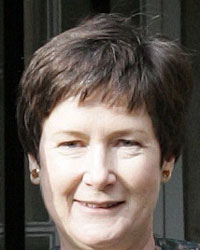Turning the clocks back each autumn has generated millions of tonnes of carbon emissions as well as increasing electricity costs during GMT months.
No evidence in favour of imposing Greenwich Mean Time in winter was found.
Dr Elizabeth Garnsey
These are the findings of a report by Dr Elizabeth Garnsey of the Department's Institute for Manufacturing (IfM) and Brendan Cronin a student in the Department on the MPhil in Engineering for Sustainable Development. "No evidence in favour of imposing Greenwich Mean Time in winter was found," says the report. Putting the clocks back results in "more traffic accidents and higher, more costly, evening peaks in electricity consumption than would occur on British Summer Time, also known as GMT+1." This is because people are more active in the early evening than in the early morning, with adverse effects from early evening darkness in Scotland as well as England and Wales. A significant factor in the energy surge is that, under GMT, around 35% of the population are asleep when the sun rises in winter and so make no use of the extra daylight. Then, because they arrive home from school or work in cold and darkness, they use more lighting and heating, causing a surge in demand, especially between 4pm and 6pm.
The report adds a new twist to an argument that has lasted more than a century.
The only unfavourable impact of ending the return to GMT would be on early morning workers. The report suggests that working hours could be altered for particular groups to counter this.
It has long been said that Britain would benefit economically from synchronising clocks with its European neighbours and that people would prefer to have more daylight in the afternoon and evening during the winter. However, such moves have been stymied by concerns over the impact on Scotland, where moving the clocks forward an hour would leave northern areas in darkness until about 9am.

Consumers are paying much more for electricity as a result of ending summer time. Delaying the timing of sunset in winter would give an extra hour of light in the evening and reduce the surge of energy demand, even taking into account the later sunrise. The costs and emissions are amplified because Britain can only meet these daily surges by switching on less efficient back-up generating plants such as oil-fired power stations. Such plants can take hours to heat up and cool down, pushing the costs and emissions of such power even higher.
The report did not look at the impact on demand for gas consumption but the authors believe it would show similar trends.
The energy-saving benefits of keeping clocks forward an hour were clear to wartime politicians. British Summer Time/GMT+1, was created in 1916 to save coal. During the second world war, Britain used GMT+1 during the winter and GMT+2 in summer, again to reduce fuel consumption.
Britain might have moved permanently to such a regime in 1971 but MPs voted against after an emotive debate involving claims that putting the clocks forward had caused an increase in winter morning road accidents to schoolchildren. What they were not told was that this was more than offset by the much greater fall in accidents in the evenings.
The report calculates that the 1971 decision has caused an extra 46 million tons of CO2 to be released since then.
There are signs that senior politicians are ready for a rethink. A spokesman for Pat McFadden, the employment minister who also has responsibility for timekeeping, said he was reading the report “with interest”.
Tim Yeo, Tory chairman of the environmental audit select committee, who earlier this year tried to use a private member’s bill to bring the clocks forward by an hour in both winter and summer for a three-year experimental period, said: “The environmental case for action is unanswerable.”

